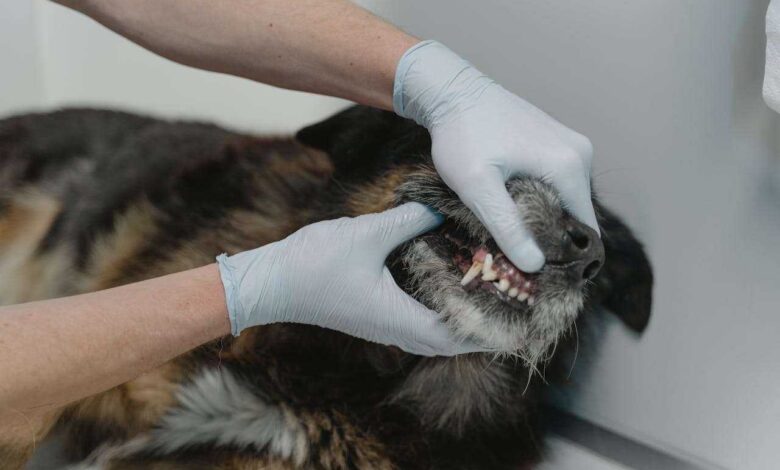
Dog bad breath, also known as halitosis, can be a distressing issue for both dogs and their owners. While occasional bad breath may be normal, persistent foul odor from a dog’s mouth could indicate underlying dental or health problems. In this in-depth guide, we’ll explore the various causes of dog bad breath, effective preventive measures, and treatment options to help you address this issue and ensure your furry friend enjoys fresh breath and optimal oral health.
Understanding and Tackling Dog Bad Breath:
Causes of Dog Bad Breath: Poor Dental Hygiene
- Dental hygiene plays a crucial role in maintaining oral health and preventing bad breath in dogs. When dental care is neglected, plaque and tartar can accumulate on the teeth, providing a breeding ground for bacteria. These bacteria release foul-smelling gases, resulting in bad breath.
Dental Disease:
- Dental diseases such as gingivitis (inflammation of the gums) and periodontitis (advanced gum disease) are common causes of bad breath in dogs. These conditions are often characterized by red, swollen gums, and may lead to tooth loss if left untreated.
Oral Infections:
- Infections of the mouth, gums, or throat can also contribute to bad breath in dogs. Bacterial, viral, or fungal infections can cause inflammation, pus formation, and tissue destruction, resulting in an unpleasant odor.
Diet:
- Diet plays a significant role in determining a dog’s breath odor. Foods with strong odors or high sulfur content, such as certain meats or fish, can cause foul-smelling breath. Additionally, inadequate chewing or swallowing of food can lead to food particles becoming trapped in the teeth, contributing to bad breath.
Underlying Health Issues:
- Bad breath can sometimes be a symptom of underlying health problems such as gastrointestinal issues, kidney disease, diabetes, or respiratory infections. These conditions can produce metabolic by-products that affect the breath odor and require veterinary attention.
Prevention of Dog Bad Breath: Regular Dental Care
- Establishing a regular dental care routine is essential for preventing bad breath in dogs. This includes daily brushing with a canine toothbrush and toothpaste, as well as regular professional dental cleanings performed by a veterinarian.
Dental Chews and Toys:
- Providing your dog with dental chews, toys, or treats can help promote oral health by mechanically removing plaque and tartar. Chewing also stimulates saliva production, which helps neutralize acids and wash away food particles.
Balanced Diet:
- Feeding your dog a balanced diet that supports dental health is crucial for preventing bad breath. Choose high-quality, dental-friendly foods that are free from artificial additives and sugars, and consider incorporating dental diets or treats recommended by your veterinarian.
Regular Veterinary Check-ups:
- Regular veterinary check-ups are essential for maintaining your dog’s oral health. Your veterinarian can perform thorough dental examinations, identify any potential issues early on, and recommend appropriate preventive measures or treatments.
Treatment of Dog Bad Breath: Professional Dental Cleaning
- If your dog has significant plaque and tartar buildup or dental disease, they may require a professional dental cleaning under anesthesia. During this procedure, a veterinarian will scale and polish the teeth, remove plaque and tartar, and address any underlying issues contributing to bad breath.
Treatment of Underlying Health Issues:
- If bad breath is caused by underlying health problems, such as gastrointestinal issues or infections, your veterinarian will develop a treatment plan tailored to your dog’s needs. This may involve medications, dietary modifications, or other interventions to address the underlying cause and improve breath odor.
Dog Bad Breath
Dog bad breath can be a sign of various dental or health issues that require attention. By understanding the causes of bad breath, implementing preventive measures, and seeking prompt veterinary care when needed, you can help your canine companion maintain fresh breath and optimal oral health. With regular dental care, a balanced diet, and routine veterinary check-ups, you can ensure your dog’s breath stays fresh and their smile stays bright for years to come.
FAQ: Dog Bad Breath
Q: What causes bad breath in dogs?
Answer: Bad breath in dogs can be caused by various factors, including poor dental hygiene, dental disease, oral infections, diet, and underlying health issues.
Q: How can I tell if my dog has bad breath?
Answer: You may notice a foul odor emanating from your dog’s mouth, which can be a sign of bad breath. Additionally, your dog may exhibit signs of dental discomfort, such as reluctance to eat or pawing at their mouth.
Q: Can bad breath in dogs indicate a serious health problem?
Answer: Yes, bad breath in dogs can sometimes be a symptom of underlying health issues such as dental disease, gastrointestinal problems, or systemic infections. It’s essential to address persistent bad breath promptly to rule out any serious conditions.
Q: Is bad breath in dogs preventable?
Answer: Yes, bad breath in dogs is often preventable with proper dental care, including regular brushing, professional cleanings, and a balanced diet. Additionally, addressing underlying health issues and maintaining overall wellness can help prevent bad breath.
Q: How often should I brush my dog’s teeth to prevent bad breath?
Answer: Ideally, you should brush your dog’s teeth daily using a canine toothbrush and toothpaste recommended by your veterinarian. Regular brushing helps remove plaque and tartar buildup, reducing the risk of bad breath and dental disease.
Q: Are there any dental chews or treats that can help freshen my dog’s breath?
Answer: Yes, there are dental chews, toys, and treats specifically designed to promote oral health and freshen breath in dogs. Look for products approved by veterinary dental associations and choose options that encourage chewing and saliva production.
Q: Can certain foods worsen my dog’s bad breath?
Answer: Yes, certain foods with strong odors or high sulfur content, such as certain meats or fish, can contribute to bad breath in dogs. Additionally, sugary or starchy foods can promote bacterial growth in the mouth, exacerbating bad breath.
Q: Should I be concerned if my dog’s breath suddenly becomes foul-smelling?
Answer: Yes, sudden onset of foul-smelling breath in dogs may indicate an underlying health issue that requires veterinary attention. It’s essential to have your dog evaluated by a veterinarian to determine the cause and appropriate treatment.
Q: Can dental disease lead to other health problems in dogs?
Answer: Yes, untreated dental disease in dogs can lead to systemic health issues such as heart disease, kidney disease, and respiratory infections. Proper dental care is essential for maintaining not only oral health but overall well-being.
Q: What should I do if my dog’s bad breath persists despite home care?
Answer: If your dog’s bad breath persists despite home care measures such as brushing and dental chews, it’s important to consult your veterinarian for a thorough dental examination and evaluation. Your veterinarian can recommend appropriate treatment options based on the underlying cause of the bad breath.








